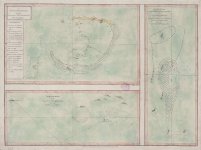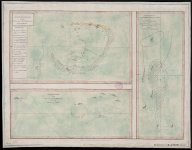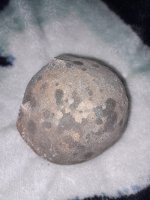You are using an out of date browser. It may not display this or other websites correctly.
You should upgrade or use an alternative browser.
You should upgrade or use an alternative browser.
Zeewijk Narrative Map
- Thread starter Arch1
- Start date
The question is: if the Dutch were the first Europeans to reach Australia, why would they give these rocks a Portuguese name? 

I know this one is known, but a cool map and reference for the insane story. Enjoy!
View attachment 1773954
Cheers;
-Arch1
agflit
Hero Member
- Mar 25, 2015
- 624
- 1,086
- Detector(s) used
- Tesoro Tigershark freshwater...Excaliber 1000 Bluetube, Aquapulse AQ1b, Marine Sonics Centurian SSS
- Primary Interest:
- Shipwrecks
The question is: if the Dutch were the first Europeans to reach Australia, why would they give these rocks a Portuguese name?
Because the origin of the Abrolhos is a word derived from the Portuguese 'abri vossos olhos!' which can be translated as "open your eyes - keep good watch!" It was coined by the Dutch navigator F. de Houtman who named the islands when he reached them in 1619.
The "Tryall" was an English ship owned by the East Indian trading Co....the Zeewijk (or Zeewyk) was an 18th-century East Indiaman of the Dutch East India Company (Vereenigde Oost-Indische Compagnie, VOC) that was shipwrecked at the Houtman Abrolhos, off the coast of Western Australia, on 9 June 1727.
The first known landing in Australia by Europeans was by Dutch navigator Willem Janszoon in 1606. ....
The first fleet of British ships actually arrived in 1788 in Sydney, NSW, and established the original Penal colony....
Just because a Dutch Navigator used a Portuguese phrase on a map does not make the discovery one of Portuguese origin...
- Thread starter
- #4
Now these are the types of things I like to hear! I post these maps more to hear about maritime history and less so regarding "treasure". I'm what you might say an "armchair archaeologist". Thanks for the replies, I look forward to posting/hearing more.
Cheers;
-C
Cheers;
-C
Well, the Roaring 40's route, that the Dutch called Brouwers route, and which took Batavia and Tryall to their deaths, was being sailed by the Portuguese since the 1550's at least. It was not "discovered" by the Dutch in 1611 - they just copied all the information from Portuguese pilots and charts, which were sailing that area for more than a century, like they did for the whole Indian Ocean. That is why that Portuguese word is there. It was named simply Abrolhos - like the one off Brazil. He just gave them his name.
Because the origin of the Abrolhos is a word derived from the Portuguese 'abri vossos olhos!' which can be translated as "open your eyes - keep good watch!" It was coined by the Dutch navigator F. de Houtman who named the islands when he reached them in 1619.
agflit
Hero Member
- Mar 25, 2015
- 624
- 1,086
- Detector(s) used
- Tesoro Tigershark freshwater...Excaliber 1000 Bluetube, Aquapulse AQ1b, Marine Sonics Centurian SSS
- Primary Interest:
- Shipwrecks
I think I'll go with the generally accepted historical accounting crediting Frederick de Houtman, Captain-General of the Dordrecht, as it was Houtman who later wrote of the discovery in a letter to the directors of the Dutch East India Company:
"On the 29th do. deeming ourselves to be in an open sea, we shaped our course north-by-east. At noon we were in 29° 32' S. Lat.; at night about three hours before daybreak, we again unexpectedly came upon a low-lying coast, a level, broken country with reefs all round it. We saw no high land or mainland, so that this shoal is to be carefully avoided as very dangerous to ships that wish to touch at this coast. It is fully ten miles in length, lying in 28° 46."[11]
Why Houtman named the islands using a Portuguese word remains a subject of debate. John Forsyth states that the islands are named after the Abrolhos Archipelago off the east coast of Brazil, which was discovered and named by Portuguese navigators early in the 16th century. This position is supported by the fact that Houtman was familiar with the Abrolhos Archipelago, having sailed through it in 1598.[13] Others assert that abrolhos was a Portuguese lookout's cry which, like many other Portuguese maritime terms, was taken up by sailors of other nationalities,[14] becoming by Houtman's time a Dutch loan word for offshore reefs.[7] Additionally, Frederick De Houtman had at least some grasp of Portuguese, having been sent by Amsterdam merchants to Lisbon from 1592 - 1594 with his brother Cornelis to learn about the Portuguese route to the Indies. Frederick also appears to have been a keen linguist, having published the first-known Dutch-Malay and Dutch-Malagasy dictionaries in 1603.[15] He appears to have been fluent-enough in Portuguese that he might have used an evocative Portuguese word if it described the area better than any Dutch word did.
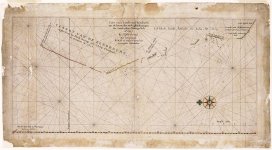
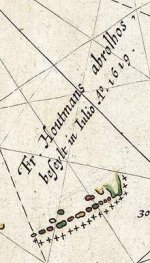
Hessel Gerritszoon's 1627 "Caert van't Landt van d'Eendracht" contains the first use of the name Houtman's Abrolhos in print.
"On the 29th do. deeming ourselves to be in an open sea, we shaped our course north-by-east. At noon we were in 29° 32' S. Lat.; at night about three hours before daybreak, we again unexpectedly came upon a low-lying coast, a level, broken country with reefs all round it. We saw no high land or mainland, so that this shoal is to be carefully avoided as very dangerous to ships that wish to touch at this coast. It is fully ten miles in length, lying in 28° 46."[11]
Why Houtman named the islands using a Portuguese word remains a subject of debate. John Forsyth states that the islands are named after the Abrolhos Archipelago off the east coast of Brazil, which was discovered and named by Portuguese navigators early in the 16th century. This position is supported by the fact that Houtman was familiar with the Abrolhos Archipelago, having sailed through it in 1598.[13] Others assert that abrolhos was a Portuguese lookout's cry which, like many other Portuguese maritime terms, was taken up by sailors of other nationalities,[14] becoming by Houtman's time a Dutch loan word for offshore reefs.[7] Additionally, Frederick De Houtman had at least some grasp of Portuguese, having been sent by Amsterdam merchants to Lisbon from 1592 - 1594 with his brother Cornelis to learn about the Portuguese route to the Indies. Frederick also appears to have been a keen linguist, having published the first-known Dutch-Malay and Dutch-Malagasy dictionaries in 1603.[15] He appears to have been fluent-enough in Portuguese that he might have used an evocative Portuguese word if it described the area better than any Dutch word did.


Hessel Gerritszoon's 1627 "Caert van't Landt van d'Eendracht" contains the first use of the name Houtman's Abrolhos in print.
Do you know who discovered the Amsterdam island, which is enroute to Australia? The Spanish Elcano, while returning from the first World tour. in 1522
Guess who named it Amsterdam? The Dutch Anthonie van Diemen... in 1633! More than a century later.
Do you know who discovered the St. Paul Island, from the same island group as the Amsterdam? The Portuguese of the "S. Paulo" Eastindiaman, in 1560. This time, they got it on a map and give it their ship's namesake.
Guess who named it Amsterdam? The Dutch Anthonie van Diemen... in 1633! More than a century later.
Do you know who discovered the St. Paul Island, from the same island group as the Amsterdam? The Portuguese of the "S. Paulo" Eastindiaman, in 1560. This time, they got it on a map and give it their ship's namesake.
Users who are viewing this thread
Total: 2 (members: 0, guests: 2)
